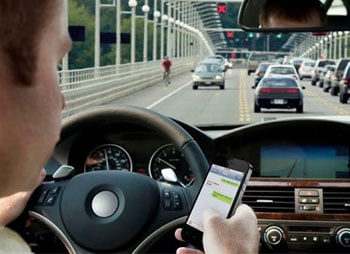
Intense work load in the office can lead to distraction in your personal life. Often, when the workplace demands attention outside of work hours, this can take shape in the form of distracted driving. Employees can frequently find themselves using their cell phones to communicate with the office during their commutes to and from work. If these distractions cause a car accident, the employer can be held responsible for any injuries or damage, even if it occurs outside of work hours.
Work-related distracted driving is a very prevalent problem in today’s workforce. According to a survey conducted by Traveler’s Insurance, 78 percent of drivers reported using their personal vehicles for work on a daily basis. The survey also reported that many also used their cell phones for work while driving.
The survey showed:
- 38 percent of drivers answer or make phone calls for work while driving
- 17 percent of drivers send and/or read text messages while driving
- 10 percent of drivers send, receive and read emails while driving
- 38 percent of employees feel they should always be reachable by phone
- 27 percent of employees say the boss calls or texts knowing they are driving
- 17 percent of employees fear job consequences if they don’t answer
It is a common theme in the workplace for employers to overload their employees and also frequently contact them before or after work hours with requests for additional work. To comply with these demands, employees usually find themselves coming in early, working late, staying up late, keeping their cell phones on 24/7, and working weekends to meet deadlines.
Today, distracted driving is the leading cause of motor vehicle accidents in the U.S. The National Safety Council reports that each year there are nearly 40,000 motor vehicle fatalities. If a car accident results from employer-related distractions, the employer can be held accountable for property damages, injuries, and fatalities.

Call For A Free Consultation
(312) 586-2820